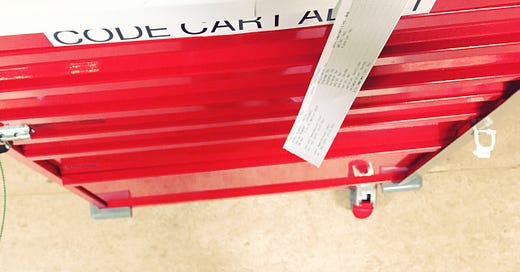Beyond Bedpans: What Registered Nurses Actually Do
Dispelling stereotypes and revealing the clinical expertise, leadership, and impact of modern nursing.
Each May, Nurses Week arrives with heartfelt thank-you notes, branded swag, and complimentary snacks in hospital break rooms. As we celebrate the profession, it's time to confront one of the most persistent and damaging myths about nursing: the stereotype that we are simply cute women who wipe butts.
Popular media and casual discourse often reduce nursing to a narrow and outdated stereotype: that of the cheerful, subservient woman whose primary role is performing basic hygiene tasks. Many of the people who hold the most outdated views of nursing have never been seriously ill or hospitalized, because those who have often gain a much deeper appreciation for the role nurses play in care and recovery. While personal care remains a fundamental component of nursing, this reductionist framing obscures the intellectual rigor, clinical complexity, and impact of the nursing profession. It is not only inaccurate, it is detrimental.
Nurses are an essential force in modern healthcare. This post aims to disrupt the stereotypes associated with general nursing practice and address the (commonly minimized or misunderstood) cognitive, relational, and leadership roles of registered nurses (RNs).
Clinical Judgment and Decision-Making
At its core, nursing is a discipline rooted in critical thinking and advanced clinical judgment. Nurses continually assess patient status, review complex diagnostic data, anticipate patient deterioration, and initiate timely interventions to promote health and/or stabilization of a patient’s condition. In high-acuity settings such as intensive care units, emergency departments, and step-down units, nurses are not merely executing orders, they are synthesizing information, utilizing advanced technologies and mechanical support devices (life support, for the lay person), prioritizing competing needs, and adapting care in real time. The ability to recognize subtle changes in patient condition and respond proactively is not intuitive, it is the result of years of education, training, and reflective practice.
Care Coordination and Health Systems Navigation
Nurses are frontline care coordinators. They navigate disjointed healthcare systems, ensure continuity of care across transitions, and prevent fragmentation that leads to poor health outcomes. Nurses communicate with interprofessional teams, identify safety concerns, advocate for appropriate referrals and escalation of care needs, and support complex discharge planning. Bedside nursing staff are often the single consistent presence in a patient’s healthcare journey, particularly for those with chronic conditions or limited health resources.
Teaching, Advocacy, and the Relational Core of Practice
Nurses are educators in formal academic settings, in clinical practice, and at the bedside. Health literacy, chronic disease management, medication adherence, and end-of-life care all rely on a nurse’s ability to teach effectively. Nursing education and practice emphasize empathy and therapeutic communication, which results in strong and trusting interpersonal relationships with patients and families.
Beyond education, nursing is a profession of advocacy. Nurses elevate the voices of vulnerable populations, promote culturally responsive care, and challenge policies that harm patients and health professionals alike. The humanistic dimension of nursing reflects a refined professional expertise that requires emotional labor, cultural humility, and ethical clarity.
Scholarship and Leadership
Nursing science is a distinct body of knowledge that underpins, but is not confined to, clinical practice. Nurse scientists advance the discipline through basic science, implementation science, health equity research, evidence-based practice, and quality improvement. They develop theoretical frameworks, conduct research, and translate evidence into meaningful clinical applications. Through these scholarly contributions, nurses shape health policy, elevate patient outcomes, and reimagine care delivery.
Although nurses are often associated with bedside care, they also serve as leaders in academia, executive boardrooms, and healthcare innovation. In clinical and organizational leadership roles, nurses influence staffing models, advocate for safe and sustainable work environments, and drive strategic initiatives that improve health systems and workforce well-being.
Reframing the Role: The Labor of Care
The notion that nursing is synonymous with low-skilled labor is rooted in gendered and classist assumptions about “women’s work”. These assumptions speak more to societal discomfort with dependency and bodily care than to the value or skill of the work itself. Providing hygiene care to a dependent adult requires not only technical competence but also communication, dignity preservation, and an awareness of vulnerability. “Wiping butts” becomes a highly skilled act when that patient has a stage IV pressure ulcer, a fresh surgical incision (+/- a wound vacuum), and multiple drains and tubes to work around. In such moments, what appears mundane is actually a complex interplay of clinical judgment, anatomical knowledge, infection control, and compassionate presence. It is neither glamorous nor trivial. But it is only one part of a broader, more complex practice. To reduce nursing to this task alone is not only factually incorrect, it is a disservice to patients, to nurses, and to the future of healthcare.
Final Thoughts
Nurses are not “just” anything. Nurses are clinical experts, educators, advocates, scientists, and leaders with degrees ranging from associate to doctorate. Nurses practice in every care setting imaginable and influence health outcomes on local, national, and global levels. As the largest and most-trusted segment of the healthcare workforce, nurses are essential to the delivery of safe, effective, and equitable care.
The time has come to retire the outdated tropes and replace them with a more accurate, more respectful, and more complete picture of what nurses truly do.
Happy Nurses Week to every nurse who shows up with skill, integrity, and compassion, even when the work is hard and the recognition is scarce.
If you're a nurse: thank you. I hope you take a moment to reflect on the depth, purpose, and impact of your work.
If you’re not a nurse: thank one. The nurses in your life are doing far more than you may realize.




